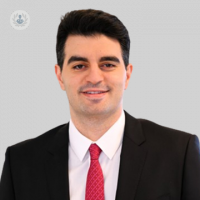Robotic Prostatectomy (prostate removal): All you need to know
Escrito por:As a leading figure in the field of urological surgery, specialising in robotic techniques for prostate cancer treatment, Mr Wissam Abou-Chedid has performed over 350 robotic prostatectomy cases in the last two years alone.
One of the techniques he specialises in is the Retzius-sparing Prostatectomy, a method that not only ensures the removal of cancerous cells but also prioritises patient comfort and better postoperative outcomes.

Why and when might robotic prostatectomy be recommended?
Robotic prostatectomy stands as a pivotal treatment option for localised prostate cancer. When cancer cells are confined within the prostate gland and haven’t spread to other areas of the body, this procedure offers a comprehensive solution by aiming to completely remove the affected gland, thereby eradicating cancer cells.
What tests are performed before robotic prostatectomy?
Before embarking on a robotic prostatectomy journey, patients undergo a series of diagnostic tests. These tests include the prostate-specific antigen (PSA) test, digital rectal examination, MRI scan, and biopsy. These assessments provide crucial insights into the extent of the condition and help in devising the most suitable surgical approach.
How Is robotic prostatectomy performed?
Robotic prostatectomy involves the meticulous removal of the entire prostate gland, as well as the seminal vesicles. Through the use of robotic arms controlled by the surgeon, the procedure is performed through small incisions. This innovative approach enhances precision and manoeuvrability, ultimately leading to better surgical outcomes for patients.
What are the potential risks and complications associated with prostatectomy?
As with any surgical procedure, robotic prostatectomy carries potential risks and complications, including bleeding, infection, blood clots, urinary incontinence, erectile dysfunction, and damage to nearby organs or tissues. However, with meticulous surgical technique and postoperative care, these risks are minimised.
Will the patient need any additional treatments after prostatectomy?
Following robotic prostatectomy, some patients may require additional treatments such as radiation therapy or hormone therapy. The need for these treatments depends on factors such as cancer aggressiveness and risk of recurrence. These supplementary therapies aim to further eliminate any remaining cancer cells and reduce the likelihood of cancer recurrence.
How soon after prostatectomy can patients resume normal activities?
Recovery time after robotic prostatectomy varies for each patient but typically involves a gradual return to normal activities. Most patients can resume light activities such as walking soon after surgery, with full recovery expected over several weeks.
Will the patient experience changes in urinary or sexual function after prostatectomy?
Robotic prostatectomy can impact urinary and sexual function due to the proximity of the prostate gland to structures involved in these functions. Potential changes may include urinary incontinence and erectile dysfunction. However, with advanced surgical techniques such as Retzius-sparing Prostatectomy, these impacts can be minimised, leading to better postoperative functional outcomes for patients.
In conclusion, robotic prostatectomy offers a comprehensive and effective treatment solution for localised prostate cancer. Through advanced techniques and personalised care, we aim to ensure optimal outcomes and improved quality of life for our patients. If you're considering robotic prostatectomy as a treatment option, I encourage you to reach out and schedule a consultation to discuss your individual needs and concerns.
To schedule an appointment with Mr Wissam Abou-Chedid, head on over to his Top Doctors profile today.


